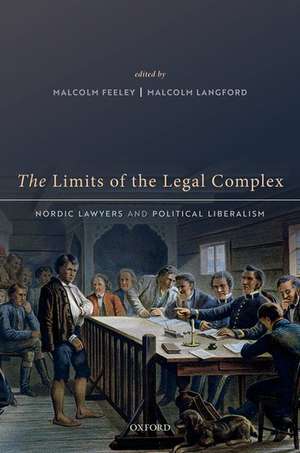The Limits of the Legal Complex: Nordic Lawyers and Political Liberalism
Editat de Malcolm Feeley, Malcolm Langforden Limba Engleză Hardback – 25 noi 2021
Preț: 564.98 lei
Preț vechi: 749.30 lei
-25% Nou
Puncte Express: 847
Preț estimativ în valută:
108.11€ • 113.18$ • 89.45£
108.11€ • 113.18$ • 89.45£
Carte disponibilă
Livrare economică 05-11 martie
Preluare comenzi: 021 569.72.76
Specificații
ISBN-13: 9780192848413
ISBN-10: 0192848410
Pagini: 304
Dimensiuni: 164 x 240 x 25 mm
Greutate: 0.61 kg
Editura: OUP OXFORD
Colecția OUP Oxford
Locul publicării:Oxford, United Kingdom
ISBN-10: 0192848410
Pagini: 304
Dimensiuni: 164 x 240 x 25 mm
Greutate: 0.61 kg
Editura: OUP OXFORD
Colecția OUP Oxford
Locul publicării:Oxford, United Kingdom
Recenzii
In this tour de force, Feeley, Langford and their fellow authors question the role of lawyers as bastions of liberalism and defenders of the rule of law in Nordic countries. Does the evidence suggest that countries in this region represent deviant cases, or rather put into question general claims about the legal complex? Must -- and highly topical -- reading for legal scholars and political scientists.
Against the backdrop of the rights revolution and the rise of adversarial legalism, the Nordic countries' history of law training as path to public administration, tradition of non-litigiousness, and resentment of American-style high-voltage constitutionalism or epic legal battles present an excellent yet seldom-explored testing ground for studying what has been termed the "legal complex". Feely and Langford have masterfully curated a high-quality, first-of-its-kind collection, combining insightful essays by country experts with integrative chapters that offer important correctives to the theory of the legal complex in light of the unique Nordic experience. The result is a major contribution to the comparative literature on the evolving role of the legal profession in advancing political liberalism and social change in stable and prosperous democracies.
The Limits of the Legal Complex raises the scholarship on legal complexes to a new level of scholarly refinement. This superb combination of empirical studies on Nordic countries, and its broad, constructively critical, theoretical extensions, notably advance comparative and historical theory on the conditions under which legal complexes have, and have not, mobilized for basic legal freedoms, an open civil society and moderate state—key elements of political liberalism—since the 17th century in Europe and across the world thereafter.
Against the backdrop of the rights revolution and the rise of adversarial legalism, the Nordic countries' history of law training as path to public administration, tradition of non-litigiousness, and resentment of American-style high-voltage constitutionalism or epic legal battles present an excellent yet seldom-explored testing ground for studying what has been termed the "legal complex". Feely and Langford have masterfully curated a high-quality, first-of-its-kind collection, combining insightful essays by country experts with integrative chapters that offer important correctives to the theory of the legal complex in light of the unique Nordic experience. The result is a major contribution to the comparative literature on the evolving role of the legal profession in advancing political liberalism and social change in stable and prosperous democracies.
The Limits of the Legal Complex raises the scholarship on legal complexes to a new level of scholarly refinement. This superb combination of empirical studies on Nordic countries, and its broad, constructively critical, theoretical extensions, notably advance comparative and historical theory on the conditions under which legal complexes have, and have not, mobilized for basic legal freedoms, an open civil society and moderate state—key elements of political liberalism—since the 17th century in Europe and across the world thereafter.
